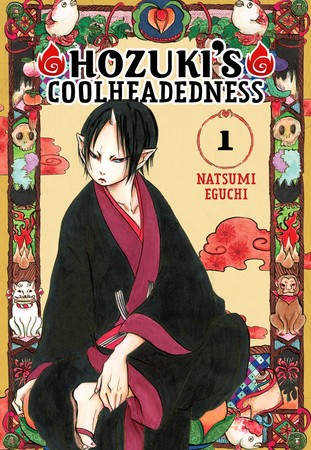
[ad_1]
Jyōji Hayashi’s Logistics of Star System Izumo novel wins “Best Japanese Long Story” award
 The 60th Japan Science Fiction Convention (Nihon SF Taikai) revealed the winners of the 52nd Seiun Awards on Wednesday. Natsumi Eguchi‘s Hozuki’s Coolheadedness manga and Toriko Gin‘s Kimi o Shinasenai tame no Storia (Story for the Sake of Keeping You Alive) manga both won the “Best Comic” award.
The 60th Japan Science Fiction Convention (Nihon SF Taikai) revealed the winners of the 52nd Seiun Awards on Wednesday. Natsumi Eguchi‘s Hozuki’s Coolheadedness manga and Toriko Gin‘s Kimi o Shinasenai tame no Storia (Story for the Sake of Keeping You Alive) manga both won the “Best Comic” award.
Additionally, Kiyotaka Taguchi and Tsuburaya Productions‘ live-action television series Ultraman Z won the “Best Media” award.
 Jyōji Hayashi’s Seikai Izumo no Heitan (Logistics of Star System Izumo) won the “Best Japanese Long Story” award. Shibata Katsuie’s “American Buddha” and voice actress/author Haruna Ikezawa‘s “Orbital Christmas” (based on the story by anime scriptwriter/science-fiction consultant Mitsuyasu Sakai) won the “Best Japanese Short Story” award. (Ikezawa previously won the “Best Non-Fiction” award in 2017 for her essay collection SF no S wa, Suteki no S or “SF” IS “SUTEKI FICTION.”)
Jyōji Hayashi’s Seikai Izumo no Heitan (Logistics of Star System Izumo) won the “Best Japanese Long Story” award. Shibata Katsuie’s “American Buddha” and voice actress/author Haruna Ikezawa‘s “Orbital Christmas” (based on the story by anime scriptwriter/science-fiction consultant Mitsuyasu Sakai) won the “Best Japanese Short Story” award. (Ikezawa previously won the “Best Non-Fiction” award in 2017 for her essay collection SF no S wa, Suteki no S or “SF” IS “SUTEKI FICTION.”)
The Japanese translation of Liu Cixin’s The Dark Forest novel (translated by Nozomi Ohmori, Toya Tachihara, Kaori Uehara and Ko Tomari) won the “Best Translated Long Story” award, and the Japanese translation of Alastair Reynolds’ “Zima Blue” short story (translated by Naoya Nakahara) won the “Best Translated Short Story” award.
Novel illustrator Yūko Shiraishi (Project Itoh‘s Harmony) won the “Best Artist” award for the second year in a row,
NHK‘s “100 Minutes on a Famous Book: Arthur C. Clarke Special ‘It’s Not Just His Imagination'” program won the “Best Non-Fiction” award. Amabie, the mythical monster whose image is said to ward off illness (and which went viral in 2020 due to the COVID-19 pandemic), won the open “Non category (Everything That Feels Sense of Wonder).”
The nominees of the Media and Comic categories were:
Best Comic
Best Media
The awards this year are again separated into nine categories: Japanese Novel, Japanese Short Story, Translated Novel, Translated Short Story, Media, Comic, Art, Nonfiction, and an “Open” category. Each category has between 6-10 nominees. The nominees were chosen among works that were released between January 1 and December 31, 2020.
Those who registered for the 60th Japan Science Fiction Convention could vote online for the winners between April 24 and June 15. The winners will be announced at the event in Takamatsu on August 21-22.
“Seiun Shō” literally translates to “nebula awards,” but the Japan SF Con’s Seiun Awards are more akin to the Hugo Awards, in that the attendees of each respective convention vote on the winners. There is another set of awards, the Science Fiction and Fantasy Writers of Japan’s Nihon SF Taishō honors, that are the rough Japanese equivalent of the Science Fiction and Fantasy Writers of America’s Nebula Awards. Like the Hugo Awards, the Seiun Awards honor all forms of speculative fiction — including but not limited to science fiction — and related materials.
Previous winners of the Seiun Awards include Kemono Friends, And Yet the Town Moves, Shin Godzilla, Kochikame, Girls und Panzer, Knights of Sidonia, The World of Narue, Bodacious Space Pirates, Range Murata, Masamune Shirow, Makoto Shinkai, Fullmetal Alchemist, Gundam: The Origin, 20th Century Boys, Summer Wars, Card Captor Sakura, Madoka Magica, Pacific Rim, Space Battleship Yamato 2199, Moyashimon, and more.
Last year, the Astra Lost in Space anime won the Media category, and Dowman Sayman‘s How Many Light-Years to Babylon? manga and Masato Hisa‘s Batman Ninja manga both won the “Best Comic” award.
Sources: Japan Science Fiction Convention, Comic Natalie
[ad_2]





